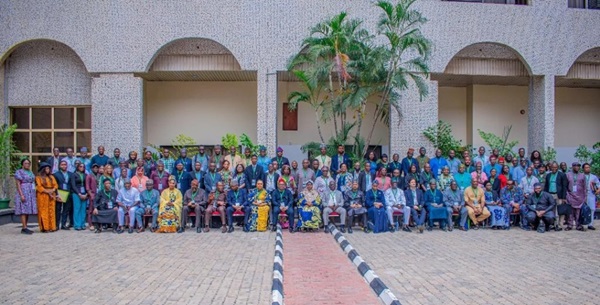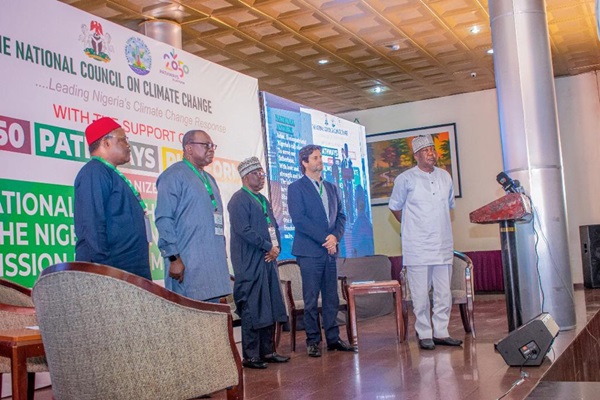
In a resolute move to combat climate change and mitigate its far-reaching consequences, the House of Representatives’ Committee on Climate Change has emphasised the critical need to cease or significantly reduce carbon emissions in the country.
Chairman of the committee, Hon. Chris Nwonta conveyed this message during the Long-Term Low Emissions Development Strategy Stakeholders’ Validation workshop organised by the National Council on Climate Change (NCCC) in partnership with other development partners in Abuja.
Represented by the senior special assistant to the House Committee Chairman on Climate Change, Dr. Chidi Nwankpa, Nwonta urged stakeholders to align with the committee’s commitment and collaborate towards achieving net zero emissions in Nigeria. He stressed the urgency of reducing greenhouse gas emissions, emphasieing that failure to do so would perpetually harm the planet, jeopardise public safety and lead to more climate disasters due to environmental pollution.
“It is pertinent, therefore, to note that studies have shown that without reducing greenhouse gas emissions, the planet will continue to be harmed, public safety will perpetually be at risk and more climate disasters as a result of the effects of environmental pollution will continue to occur,” stated Nwonta.
He reaffirmed the committee’s dedication to the net zero carbon emissions goal, ensuring a healthier and sustainable environment for human existence. Nwonta expressed confidence in the significance of the workshop, describing it as “pivotal to developing a competitive and sustainable long-term low emissions development strategy for Nigeria”.
Commending the collaborative efforts of various stakeholders, including the National Council on Climate Change (NCCC), National Assembly, related institutions, agencies, non-governmental organisations and other critical stakeholders, Nwonta acknowledged their commitment to creating workable and sustainable frameworks aligned with Nigeria’s commitment to the Paris Agreement.

The director-general of NCCC, Dr. Salisu Dahiru highlighted the visionary nature of Nigeria’s Long-Term Low-Emission Development Strategy 2060. He emphasised its role as a blueprint for transitioning into a more resilient, green and inclusive economy. According to Dahiru, the strategy embodies a pledge to preserve the environment, protect the masses and ensure economic prosperity for future generations.
Describing the strategy as a shared vision, Dahiru stated, “Within its details lie ambitious targets, innovative solutions, and a collaborative spirit that forms the foundation of our journey. This isn’t merely a document; it’s our shared vision, encapsulating the aspirations of our youth, the wisdom of our elders, and the dreams of future generations”.
The workshop served as a crucial platform to present updates on Nigeria’s progress in global commitments to curb greenhouse gas emissions within the UNFCCC process. Dahiru noted that the strategy document would support Nigeria’s revised 2021 Nationally Determined Contributions (NDCs) under the Paris Agreement, demonstrating the nation’s commitment to unconditionally reduce emissions by 20 per cent by 2030, with a conditional increase to 47 per cent.
Dahiru further acknowledged the challenges ahead but called for resolute commitment from political leaders, ministers, representatives and National Assembly members to support Nigerian initiatives toward a net-zero trajectory without compromising national resources. He urged collective efforts to pioneer a low-emission, high-impact future for Nigeria, emphasising that the path to a sustainable future is also the path to progress, cleaner air, enhanced health, inclusivity, food security, green job creation and improved livelihoods for all Nigerians.
Representative of the Enugu State governor, Prof. Samuel Ugwu said the state is witnessing devastation caused by miners. He added that the state is participating in the meeting with the aim to interact with climate actors and international donors to promote the states quest to build a heathier environment.
According to him, “In Enugu State we have a lot of environmental degradation, we’ve seen a lot of devastation going on and it has caused a lot of climate change. A lot of people who are mining cause emissions in the state.
“We’ve done some investigations and found out that the areas these people are operating in are polluted and the new government, that is just about six months old, has a deep interest in ensuring that the environmental conditions of people are taken good care of. We want to leave the state better than we met it.”


